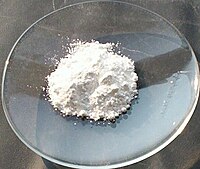
Photo from wikipedia
Titanium alloys are considered as hard-to-cut material due to its relatively high resistance to corrosion, low thermal conductivity and high chemical reactivity. Effective penetration of sufficient amount of lubricant in… Click to show full abstract
Titanium alloys are considered as hard-to-cut material due to its relatively high resistance to corrosion, low thermal conductivity and high chemical reactivity. Effective penetration of sufficient amount of lubricant in the metalworking process is of utmost importance to (a) reduce frictional resistance at the high-temperature tool–workpiece interface and (b) avert the formation of built-up edge in machining process. Traditionally, the lubricant forms a thin fluid film to reduce the friction. In order to reduce or eliminate coolant usage and to apply lubri-coolant efficiently at tool–chip–workpiece interface, a novel near-dry machining technique called electrostatic charged solid lubricant spray system has been developed. In electrostatic charged solid lubricant spray technique, the aerosolized micro-droplet particles were sprayed from the nozzle tip which uses a phenomenon called contact-charge electrification principle. The quick penetration and wettability of charged atomized droplet particles are impinged with high velocity at the tool–chip interface. The focus of the present experimental research is to analyse the optimum lubrication process parameters of the experimental set-up in terms of effectively applying cutting fluid in the machining zone. The study shows that the desired atomization and machining performance of the electrostatic charged solid lubricant spray technique can be obtained by governing different spray parameters (lubricant flow rate, air pressure, spray nozzle position, nozzle distance, electrostatic voltage). The results revealed that when the charged lubricants are applied with high velocity and large number of droplets, it will have significant influence on surface roughness and cutting force. The fabricated electrostatic charged solid lubricant spray technique provides us with an efficient and economic machining solution by applying solid lubricants effectively at tool–material interface during turning of Ti-6Al-4V alloy material. The present approach and the obtained results will help in better understanding of the machinability of hard-to-cut materials in manufacturing industries.
Journal Title: Proceedings of the Institution of Mechanical Engineers, Part B: Journal of Engineering Manufacture
Year Published: 2020
Link to full text (if available)
Share on Social Media: Sign Up to like & get
recommendations!